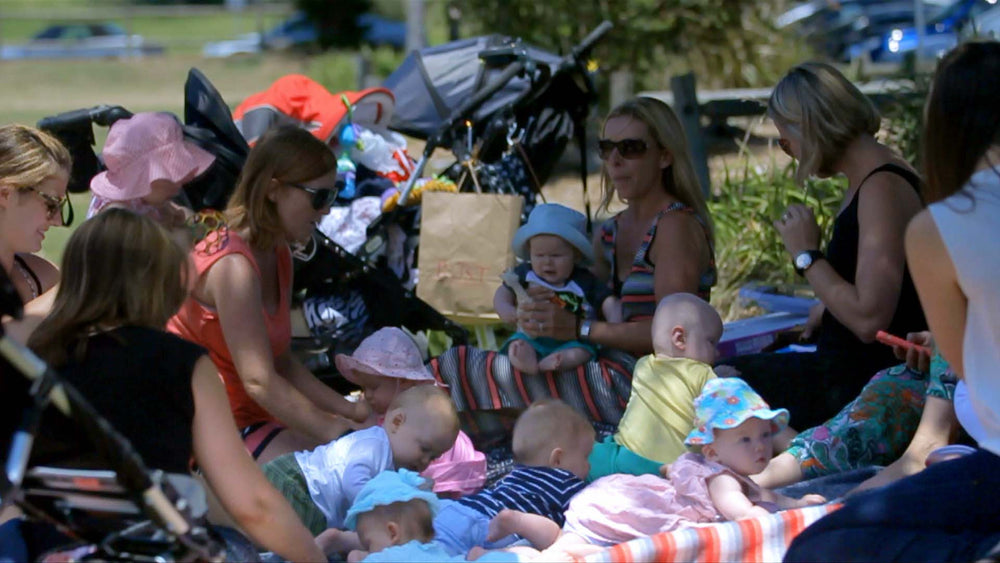
Last Thursday night I was exhausted. The last thing I felt like doing was getting dressed up and heading out. But this was an engagement I had to keep. Not because it had some important work purpose or because I was obligated to go. It was for my mental health. I hadn’t caught up with a particular group of women for over a month. The instant I saw them, I knew I wanted and needed to be there.
If you’ve seen my film The Connection you may recall seeing vision of women with their babies sitting happily in a park. Although the setting is picturesque, these are not contrived images of a group of actors. The shots were taken in my local park and they feature my mother’s group that I have known and loved for 18 months.
It seems like an age has past since our first meeting when we sat around in a circle in various states of sleep deprivation with our babies squawking, feeding or sleeping. In turn we shared our story of giving birth. What we had all been through was nothing short of epic. I felt an instant connection with them. That was the beginning of something unique – a group of women coming together to share and support each other through a common experience.
Dr. David Spiegel, who is one of the experts I interviewed for The Connection is renowned for his work looking at the impact of group support on our health. I have written here about his work showing dramatic benefits of support groups in the treatment of women with breast cancer. His initial work caused a huge fuss in the 1980s because it demonstrated that women with breast cancer in a support group lived longer and it signaled the dawn of evidence based mind body medicine. Now a new study published this month has regenerated the buzz.
Researchers from the University of Calgary Department of Oncology have shown that practicing mindfulness meditation or being involved in a support group has a positive physical impact at the cellular level in breast cancer survivors. They’ve demonstrated that telomeres (which are little caps that sit on the ends of our chromosomes like shoelaces and shorten as we age) maintain their length in breast cancer survivors who practice meditation or are involved in support groups. The telomeres of a comparison group without any intervention got shorter. This information is made even more compelling with the knowledge that shortened telomeres are linked to higher chances of getting cancer and higher mortality if you get cancer.
We’ve known for a while that meditation can affect telomere length and I’ve written about it here. But now we know that group support can too. Dr. Spiegel explained to me that the power of a community makes perfect sense if you think about it from an evolutionary perspective. “If you think about it physically, we're pretty pathetic. We're not that big, we're not that strong, we're not that fast. Animals can smell better than us, see better than us, hear better than us. What have we got? We've got an opposing thumb; that's a good thing, and we’ve got a big brain. And the brain enables us to form connections with others and build networks of support that help us stay alive, deal with threat, nurture our young and create stable and relatively safe cultures. So, it is social connection that has enabled us to survive in this world,” says Dr. Spiegel. Here’s a video of him elaborating.
I have written too about Dr. Dean Ornish’s program for reversing heart disease, a major component of which is group support. “Study after study has shown that people who are lonely and depressed and isolated are 3-10 times more likely to get sick and die prematurely than those who have a sense of love and connection and support. And I don’t know anything – any single factor in medicine – not smoking, not cholesterol, not blood pressure – that affects our lives and our survival to that degree,” says Dr. Ornish.
Looking back, I joined our mother’s group hesitantly. I already had close friends with babies the same age as mine. Between my family, friends and work obligations, I thought my life was full enough. But my mother in law insisted I go. “Just go for the first few weeks,” she said. And I’m so glad I listened.
Although these days our weekly group catch-ups have turned into monthly catch-ups and we’ve settled into our different busy rhythms, it is not our differences that matter, but rather our common bond of motherhood. Their friendship makes me feel better and that I am not alone. The fact that their friendship may also help slow my cellular ageing is a massive bonus.
Since I released The Connection last month, many people have been asking me what they should be doing in order to either stay healthy or aid their own recovery from illness. Of course there are the obvious things highlighted in the film like introducing regular mind balancing activities such as meditation, tai chi or yoga, but having looked into the compelling science showing of the power of support, I am convinced one of the most important things we can do is to prioritize being connected to our community.
We can do this by making time to catch up with close friends and family, but I am also a believer in the power of being part of a group. So whether it’s a local meditation group, a chronic illness support group, or even a book club or a sports team, my suggestion to you is to get out there and get connected. It’s good for you.





 The Connection (DOWNLOAD-TO-OWN)
The Connection (DOWNLOAD-TO-OWN) My Year Of Living Mindfully - Book
My Year Of Living Mindfully - Book




